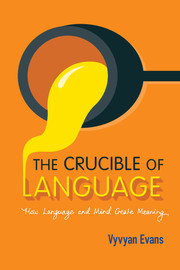Book contents
- Frontmatter
- Dedication
- Epigraph
- Contents
- List of figures
- List of tables
- Preface
- Acknowledgements
- I The ineffability of meaning
- Chapter 1 Unweaving a mystery
- Chapter 2 The alchemist, the crucible and the ineffability of meaning
- II Meaning in mind
- III Meaning in language
- Epilogue: The golden triangle
- Notes
- References
- Index
Chapter 1 - Unweaving a mystery
from I - The ineffability of meaning
Published online by Cambridge University Press: 05 November 2015
- Frontmatter
- Dedication
- Epigraph
- Contents
- List of figures
- List of tables
- Preface
- Acknowledgements
- I The ineffability of meaning
- Chapter 1 Unweaving a mystery
- Chapter 2 The alchemist, the crucible and the ineffability of meaning
- II Meaning in mind
- III Meaning in language
- Epilogue: The golden triangle
- Notes
- References
- Index
Summary
Like many other species, we are minded creatures: we store representations of the world around us, and of our own internal bodily states. But unlike other species, we also have language: an unheralded means of packaging these representations – our thoughts – and rendering them public. Sometimes we use language for the better – when we share our pearls of wisdom with a friend in their hour of need – and sometimes for the worse, and to our regret – something spoken in the heat of the moment cannot, alas, be taken back, and may not always be forgiven, or forgotten. Making thought public is the hallmark of communication. And while language may, on occasion, be an imperfect means of achieving this, it nevertheless gets the job done. But communication is dependent on something more mysterious, the seemingly ineffable elixir of communication: meaning.
Meaning presents itself in a variety of ways. The dark, menacing clouds slowly creeping by in the sky outside, as I look through my window, mean rain. A red traffic signal means stop. The ‘recycle bin’ icon on my computer desktop means that's where I place an unwanted file. And the yellow and black colouration of a droning wasp means danger: don't touch.
But having language raises the stakes. Think about it for a second: after all, you're currently reading marks on paper, or on a computer screen. While you could be watching dark, menacing clouds through a window, or sitting at a stop signal, or contemplating deleting a computer file, the chances are you're not. You've used the orthographic representations that I've typed – and that you've just read – to conjure up complex ideas – lowering clouds, computers, traffic signals and wasps. For creatures with language – us – meaning appears to arise, in particular and most saliently, in the liminal space between the private world of thought and the very public shop window of language. I can use it to suggest ideas that you might then call up from your past, such as your first pet, or your first day at school, or your first date, or the first time you kissed; or I can use it to prompt you to think about ideas you're not actually experiencing in the here-and-now, such as a droning wasp meaning danger.
- Type
- Chapter
- Information
- The Crucible of LanguageHow Language and Mind Create Meaning, pp. 3 - 8Publisher: Cambridge University PressPrint publication year: 2015



